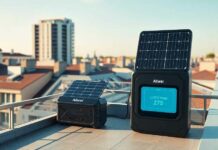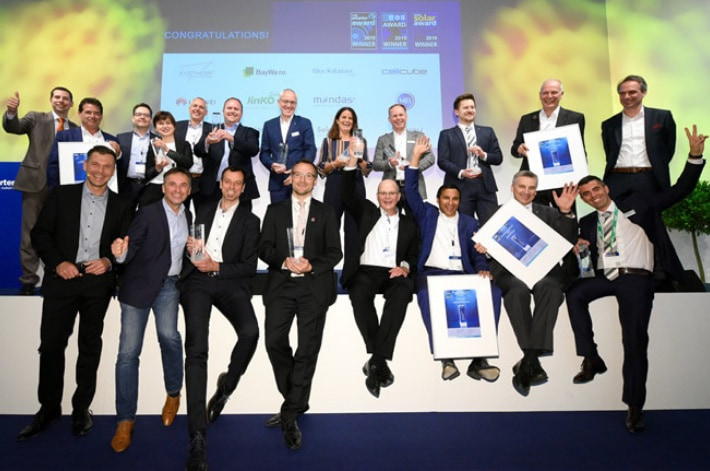Innovative power plants for sustainable energy supply and efficient energy storage systems take home this year’s The smarter E AWARD. Axiotherm GmbH, SolarGaps and Stäubli Electrical Connectors GmbH are the winning contenders in the Outstanding Projects category. In the Smart Renewable Energy category, the accolade goes to BayWa r.e. renewable energy GmbH, mondas GmbH and Siemens AG. The awards were presented this year for the second time at a ceremony held on May 15 as part of The smarter E Europe, the continent’s largest platform for the energy industry.
Since 2018, The smarter E Europe – the innovation hub for new energy solutions – has bestowed an award bearing its name to the creators of outstanding developments for the new energy world. The winners were chosen from ten finalists in each of the two categories Outstanding Projects and Smart Renewable Energy. Outstanding Project candidates come from the areas of solar, storage, energy management and clean transportation. There is a special focus on the combination of storage technologies and photovoltaics to ensure the availability and stability of renewable energies. A central factor in the Smart Renewable Energy category is sector coupling – the digital and efficient linking of electrical energy, heat and mobility – with an emphasis on intelligent energy management systems and grid infrastructure for renewable energies, particularly in the heat and transportation sectors. Three winners in each category were chosen by an international panel of expert judges.
Winners in the Outstanding Projects category
BayWa r.e. renewable energy GmbH (Germany): Don Rodrigo – Europe’s first subsidy-free photovoltaic power plant on a supply scale
Part of BayWa AG and headquartered in Munich, BayWa r.e. is a global renewable energy developer, service supplier, wholesaler, and energy solutions provider. Located not far from Seville, Spain, Don Rodrigo it is not just one of the largest photovoltaic power plants in Europe – it is also the first large-scale PV power plant in Europe built without state subsidies. Nevertheless, the project had to follow the same four-year application process as conventional power plants.
The panel of judges sees this as a flagship project for Europe, showing that grid parity is perfectly possible on this large scale. With a solid business case bolstered by instruments for long-term financing, the project demonstrates great innovation and reflects a major shift in public perception of PV’s sustainability and profitability.
mondas GmbH (Germany): Smart heat grid for 1,350 Freiburg inhabitants
Founded in 2018, mondas is run by a team of eight IT experts, experienced building services engineers, and system planners. A new residential district in Freiburg, Germany, is now home to an intelligent heat grid with 38 decentralized solar thermal systems connected to 525 residential units. This feeds thermal energy into a local heating network, which is also supplied by a biomethane combined heat and power plant. mondas used artificial intelligence control algorithms in its analytic software to gather measurement data, yields, and demand values for all 38 solar thermal systems.
The panel of judges was excited by the integration of digitalization in solar thermal CHP technology as well as the modular design of the solar heat grid, which was constructed with the support of a local supplier.
Siemens AG (Germany): Isabela hybrid power plant – Galápagos island home to sustainable energy system
Siemens is one of the world’s largest suppliers of power generation and transmission systems. The company has created a smart hybrid energy system on Isabela Island, the largest of Ecuador’s Galápagos Islands. The system runs on solar PV energy and sustainably grown jatropha biofuel, and it supplies the island with 100 percent renewable power. A UNESCO World Heritage Site, the Galápagos archipelago requires a highly reliable power supply despite being a unique, remote area under strict protection.
The panel of judges rewarded this demonstration of a complex renewable electricity solution, which replaces diesel and eliminates the associated environmental risks. Teaching local inhabitants about the maintenance and operation of the plant is part of the innovative approach to decentrally controlled applications.
Winners in the Smart Renewable Energy category
Axiotherm GmbH (Germany): kraftBoxx – large-scale thermal energy storage for sector coupling
Axiotherm has been working with phase change materials (PCMs) in all fields of engineering since 2015. PCMs can absorb or release large amounts of latent heat when they change their physical state. kraftBoxx, a thermal energy storage unit that uses latent storage technology for heating and hot water, has a higher energy storage capacity than conventional heat and cold storage systems. This efficient power-to-heat solution increases heat capacity without taking up additional space.
The panel was impressed with the unit’s high energy-storage capacity, which makes it ideal for sector coupling in single-family homes. Comprising a latent heat accumulator, an electrothermal station, a fresh water station and an intelligent controller, the modular and scalable system enables the use of surplus solar power for heating purposes and increases the proportion of self-consumption.
SolarGaps (Ukraine): Smart, energy-generating solar blinds
The Ukrainian start-up SolarGaps has been working in the field of energy efficiency and climate-friendly technologies for the last three years. It has invented “smart shading” exterior window blinds that enable the production of green energy on the outside of windows. Installation on previously unused window surfaces is an important next step for building-integrated PV and it offers an alternative to those who are reluctant to install conventional PV panels. The PV blinds can either be controlled by a smartphone app or adjust themselves automatically for optimum sun exposure.
The judges honored the invention for its compatibility with smart building systems and the blinds’ ability to maximize energy generation by adjusting to the position of the sun. Supplied with microinverters, which convert DC into AC, the blinds’ junction box can also be used to directly supply power to electrical appliances.
Staubli Electrical Connectors GmbH (Germany): Power-Blox – the mobile power socket
Originally founded in 1892 as a small workshop in Zurich, Stäubli has transformed into an international mechatronics solution provider for connectors, robotics, and textiles. The Stäubli Power-Blox is a modular storage system for solar energy that offers AC power up to the megawatt range. It is comprised of intelligent energy cubes with integrated battery storage, is designed for outdoor off-grid applications, and can be charged via a solar module. Based on patented, self-organizing swarm technology, this approach offers benefits in terms of simplicity, scalability, and security.
The judges were impressed by the user-friendly “portable socket” aspect for off-grid energy demands, as well as the ease and convenience of supplying electricity to households or small businesses in areas with limited grid access.




































